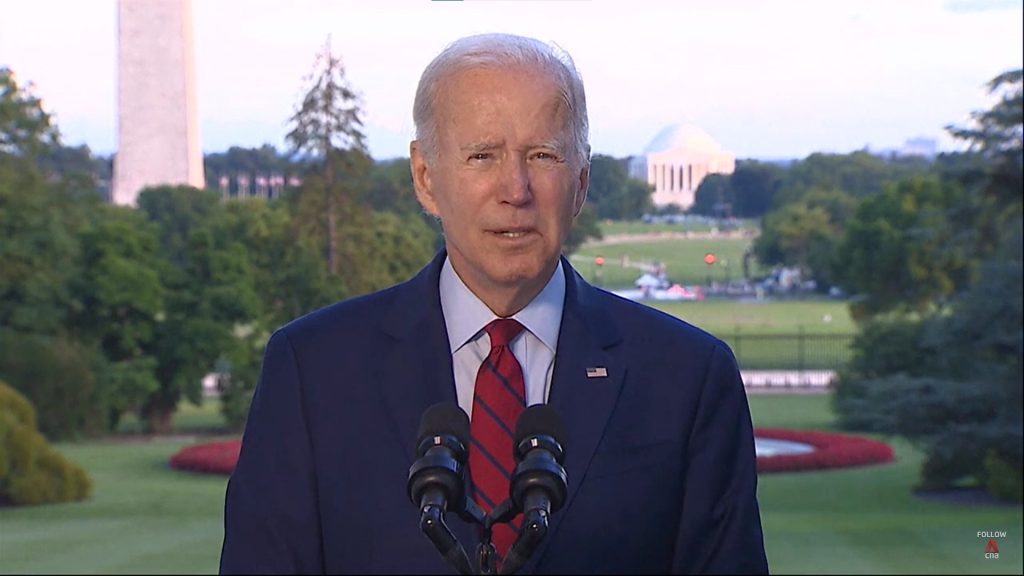Al-Qaeda leader Ayman al-Zawahiri has been officially declared dead after the United States launched a drone attack in the Afghan capital Kabul on a Sunday morning at 6:18am (SGT 9:48am).
This is the largest blow to the terrorist group since its founder, Osama bin Laden, was also killed by a drone attack in Pakistan in 2011.
The Drone Attack
Prior to the announcement of his death, Zawahiri was rumoured to be in either the tribal area of Pakistan or inside Afghanistan.
According to a senior US official, finding Zawahiri’s whereabouts was the result of persistent counterterrorism work.
Sometime this year, the US managed to identify that Zawahiri’s wife, daughter and her children had relocated to another safe house in Kabul, then discovered that Zawahiri was present as well.
The US official notes that once the Al-Qaeda leader arrived there, he never left the safehouse.
However, he was spotted on the balcony multiple times.
For the past few weeks, Biden gathered his military officials to study the intelligence.

He received periodic updates throughout May and June, and was later briefed about a proposed operation on 1 July.
On 25 July, he was given an updated report and green-lit the strike once an opportunity was available.
In a televised address, US President Joe Biden stated that the drone operation began on Saturday (30 Jul).
“I gave the final approval to go get him,” he said.
On an early Sunday morning (31 Jul), the drone fired two missiles at Zawahiri while he stood on the balcony of the safehouse.
A loud explosion in Kabul was heard. A Taliban source, who wishes to remain anonymous, testified that there were reports of one drone flying over Kabul that morning.
Reportedly, his family members were present, but they were unscathed and only Zawahiri was eliminated.
The Responses from US and Taliban
When Biden stepped into the Oval Office after being elected as the 46th President of the United States of America, one of his defining acts was withdrawing military troops from Afghanistan.
In 2020, the US and Taliban came together in Doha to sign a peace deal, which eventually paved the way for US withdrawal from Afghanistan on 31 August 2021.
Back then, Taliban had agreed not to allow Al-Qaeda or any other extremist group to operate in areas under them. This is the first known over-the-horizon strike executed by the US on an Al-Qaeda target in Afghanistan since then.
Biden also said that his killing will bring closure to families of the victims who had fallen during the September 2001 terrorist attacks on the twin towers of the World Trade Centre and Pentagon.

“No matter how long it takes, no matter where you hide, if you are a threat to our people, the United State will find you and take you out,” Biden said, adding that “we shall never wave from defending our nation and its people”.
On the other side of the pond, Taliban spokesperson Zabihullah Mujahid confirmed that a strike occurred and strongly condemned it by calling it a violation of “international principles”.
Who was Ayman al-Zawahiri?
While Osama bin Laden was considered the founder and face of Al-Qaeda, the Egyptian doctor and surgeon was viewed as bin Laden’s right-hand man and the Chief Idealogue of the militant group.
In recent years, Zawahiri emerged as Al-Qaeda’s most prominent spokesman as he appeared in 16 videos and audiotapes in 2007, which is four times as many as bin Laden.
He was featured in a video released this April, where he praised an Indian Muslim woman for contravening the ban on wearing Islamic head scarves.
His last known public address was an audio message released on 13 July by the media arm of Al-Qaeda.
Ayam al-Zawahiri was born in Cairo, Egypt, on 19 June 1951. He came from a respectable middle-class family of doctors and scholars.
Zawahiri became involved in political Islam at the tender age of 15 while he was still schooling, becoming a member of the outlawed Muslim Brotherhood—Egypt’s oldest and largest Islamist organisation.
His decision was supposedly influenced by his disgust over the Egyptian regime’s imprisonment and execution of figures like Sayyid Qutb, who was a leading jihadi theologian.
Despite his political affiliations, Zawahiri finished his studies at Cairo University’s medical school, from which he graduated in 1974, and secured a master’s degree in surgery four years later.
He was quickly drawn to radical Islam groups that were calling for the overthrowing of the Egyptian government.
When the al-Jihad (often referred to as Egyptian Islamic Jihad to differentiate it from the Palestinian group of the same name) was established in 1973, Zawahiri joined it.
Back then, Zawahiri’s main objective was overthrowing secular Arab governments and replacing them with regimes governed by Islamic law. As late as 1995, he would assert that “Jerusalem will not be conquered unless Cairo is conquered and the battle in Egypt and Algeria is won.”
The Islamic ideology proliferated among those coming of age in the 1960s and 1970s, especially after the crushing Israeli victory in the 1967 Six-Day War.
Young Arabs started to wonder why God had abandoned them, only to conclude that their leaders and societies had turned their backs on Islam. Thus, only a zealous embrace of their faith would restore God’s favour.
Although Anwar Sadat, the new Egyptian president who rose to power in 1970, saw the Islamists as a useful counterweight to his leftist rivals and gave them more than enough room to organise and spread their message, his last defining act enraged the Islamists.
Sadat had chosen to make peace with Israel, which was a terrible move in the eyes of radicals like Zawahiri, and he also refused to implement the strict Islamic law.
As such, members of the al-Jihad assassinated Sadat in October 1981.
Although Zawahiri wasn’t directly involved in the assassination, he was still identified and arrested in the following police crackdown and tortured in prison.

It is widely believed that his time in jail transformed him into a fanatical and violent extremist.
After Zawahiri was released in 1985, he left for Saudi Arabia.
He moved to Peshawar in Pakistan, before resettling in Afghanistan, where he established his own Egyptian Islamic Jihad faction while working as a doctor during the country’s Soviet occupation.
He took over the leadership of Egyptian Islamic Jihad once it re-emerged in 1993, becoming a key figure in a series of attacks that targeted Egyptian government ministers, including the Prime Minister Atif Sidqi.
The militant group’s campaign to topple the government and establish an Islamic state during the mid-1990s resulted in the deaths of more than 1,200 Egyptians.
In 1999, he was sentenced to death in absentia by an Egyptian military court for his role in the numerous terrorist attacks.
Join our Telegram channel for more entertaining and informative articles at https://t.me/goodyfeedsg or download the Goody Feed app here: https://goodyfeed.com/app/
His Role in Al-Qaeda
In 1998, the Egyptian Islamic Jihad that Zawahiri was leading joined five other radical Islamist militant groups, including bin Laden’s Al-Qaeda, to form the World Islamic Front for Jihad against Jews and Crusaders.
They signed a fatwa, and the first proclamation—or religious edict—permitted the killing of US civilians.
It declared, “The judgement to kill and fight Americans and their allies, whether civilian or military, is an obligation for every Muslim.”
Six months after the fatwa was signed, two simultaneous attacks destroyed the US embassies in Kenya and Tanzania, killing 223 people.
Zawahiri’s satellite telephone conversations were used as evidence as bin Laden and Al-Qaeda were behind the plot.
Ayman al-Zawahiri was largely known as the ideological brains behind al-Qaeda.
Although sources differ on how much involvement Zawahiri had in the September 2001 terrorist attack, it’s indisputable that he gained notoriety afterwards.
After Osama bin Laden was assassinated in 2011, Zawahiri took up the helm.
Under his leadership, Al-Qaeda went through some important changes.
For instance, Zawahiri gave affiliated groups more authority to pursue their own goals, justifying this as a tactic to keep the overall movement strong.
He made new affiliates such as al-Shabab in the Horn of Africa, assisting the group in developing explosives to target US aviation. This gave Al-Qaeda a foothold in Africa, where it aimed to spread its influence.
He also continued a working relationship with Tehran, the leading Shitte power, in spite of the enmity between his followers and Shitte movements.
Zawahiri was considered a “pragmatic” leader as he called for restraint or discretion when choosing targets, and warned his fellow jihadis against seizing territory before the opportunity was right.
Alas, he was less charismatic than bin Laden; a flaw that plagued him as a leader.
Although Zawahiri ensured the continuity of Al-Qaeda, it lost influence to its Iraqi branch when the Syrian Civil War broke out in 2013.
The resistance against Syrian President Bashar al-Assad’s regime was gaining traction among Muslims and non-Muslims. This eventually spurred the Iraqi branch to declare itself as the Islamic State of Iraq and Syria (ISIS), which came to overshadow Al-Qaeda due to its successes on the battlefield.
Shortly thereafter, ISIS declared itself a caliphate in 2014.
While ISIS further motivated the broader jihadi movement in the short term, it had also created too many enemies, which caused the movement to eventually lose ground.
When the caliphate lost its last significant territory in 2019, much of the jihadis movement’s appeal was diminished.
According to a former director of the US National Counterterrorism Centre, Al-Qaeda is “in crisis” as it is not at all popular among the Muslims.
The theocracy that Al-Qaeda envisions have not been implemented by any Muslim-majority state, with the exception of Taliban rule in Afghanistan, which was already in place until the 9/11 attacks disrupted it.
Given the militant group’s current state, Zawahiri’s successor will face the same issues that Zawahiri had to face, such as the restrictions on fundraising, travel and communication, as well as other formidable rivals.
A steady decline seems more likely for Al-Qaeda, in truth.
Read Also:
- M’sia Minister Said They Can Now Export Chickens As Situation Has Stabilised
- Jaguar Driver Responds to Parking Incident; Claims He Was Just Trying to Overtake the Black Honda
- TR Emeritus Lost Class Action Suit Against S’pore Gov & Started Crowdfunding for Legal Costs
Featured Image: SITE Intelligence Group
Would you be jailed for being half-naked in public? Well, the answer will shock you. Seriously. Watch this to the end and you'll understand:



